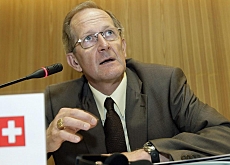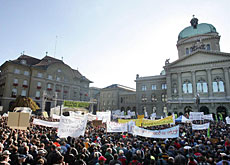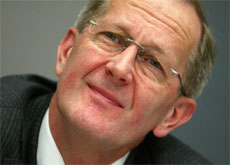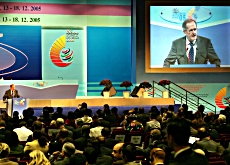Deiss calls for give and take at WTO talks

Global trade talks are at a "critical juncture" and the big players need to find common ground to avoid failure, according to Swiss Economics Minister Joseph Deiss.
Speaking in Geneva as ministers began make-or-break talks at the World Trade Organisation, Deiss signalled that the G10 group of net agricultural importers could be prepared to make concessions.
But he said the group was determined to defend its position on crucial issues such as market access.
Deiss is head of the Swiss delegation at the WTO meeting and is also representing the interests of the G10 group.
The negotiations began on Thursday with ministers under pressure to approve deep cuts to farm subsidies and steeply lower tariffs in agriculture and industrial goods.
Without a breakthrough, the WTO’s Doha Round of free trade negotiations faces possible failure after more than four years of hard haggling.
“We’re at a critical point, and our task is considerable,” Deiss said. “We are ready to make our contribution, but we are also determined to defend our position.”
Deiss said progress in the Doha Round depended on the main players working together more.
“If the United States, European Union and leading G20 countries can’t do so, then it’s very difficult for others to make proposals to advance the negotiations,” he told swissinfo.
Ministers are trying to reach key decisions on the three pillars of the talks: market access; export competition and domestic support.
Deiss is hopeful of an answer – if not a final one – this weekend on the key issue referred to in WTO circles as the so-called triangle: the US position on domestic support; where the EU stands on market access and the G20 contribution on industrial goods.
“The cost of failure could be serious – for the world economy as a whole, and for developed countries. But it’s particularly important that we find an overall solution for the developing countries,” added Deiss.
Market access
Ministers from the G10 have reconfirmed their willingness to find answers to the agriculture negotiations with an outcome acceptable to all participants.
While seeking a balanced result for all three pillars, market access is clearly the most sensitive issue for the G10 countries.
“The G10 and Switzerland continue to oppose tariff capping on agricultural products and hope to reach agreement on exceptions for farm goods considered ‘sensitive’,” explained the economics minister.
The argument focuses on how many products should be considered sensitive. The EU says it should be eight per cent of tariff lines. The US and the G20 have offered one per cent, while the G10 wants 15 per cent.
Deiss explained that the calculation of average tariff cuts and the list of “sensitive” products were closely interlinked and they had to be negotiated together.
Farming concerns
The economic minister’s words follow close on the heels of concerns expressed by the Swiss Farmers Association, which on Wednesday warned that farmers livelihoods would be under threat in many countries if markets are opened up to imports by cutting tariffs.
According to Jacques Bourgeois, the association’s director, if a proposal made by the G20 group of the 20 biggest industrialised and emerging nations was accepted at WTO talks, custom duties could be cut by up to 90 per cent in some cases.
He added that this – along with reductions in subsidies – was more likely to benefit major agricultural producers rather than developing nations.
According to Bourgeois, dropping tariffs would have “dramatic” consequences for farmers’ families. The farmers’ association reckons that accepting the G20 proposal would amount to cutting farming revenue in Switzerland by SFr3 billion ($2.41 billion).
swissinfo, Simon Bradley in Geneva
The 149 members of the WTO have been negotiating the latest round of talks on the liberalisation of trade of goods and services since 2001.
Trade ministers from some 50 WTO states are gathering in Geneva this week to try to agree on cuts to farm subsidies and lower tariffs in agricultural and industrial goods.
Switzerland has been defending its agricultural policies while pushing for liberalisation of services and lower tariffs for industry.
The WTO has asked the Swiss to lower farming subsidies and import tariffs on agricultural products.
Switzerland presides over the G10, a group of nine countries that are leading net importers of agricultural products. The members include South Korea, Japan, Norway, Iceland, Israel and Taiwan.
The G20 is a group of developing countries, including South Africa, Brazil, China, India and Kenya.

In compliance with the JTI standards
More: SWI swissinfo.ch certified by the Journalism Trust Initiative












You can find an overview of ongoing debates with our journalists here . Please join us!
If you want to start a conversation about a topic raised in this article or want to report factual errors, email us at english@swissinfo.ch.